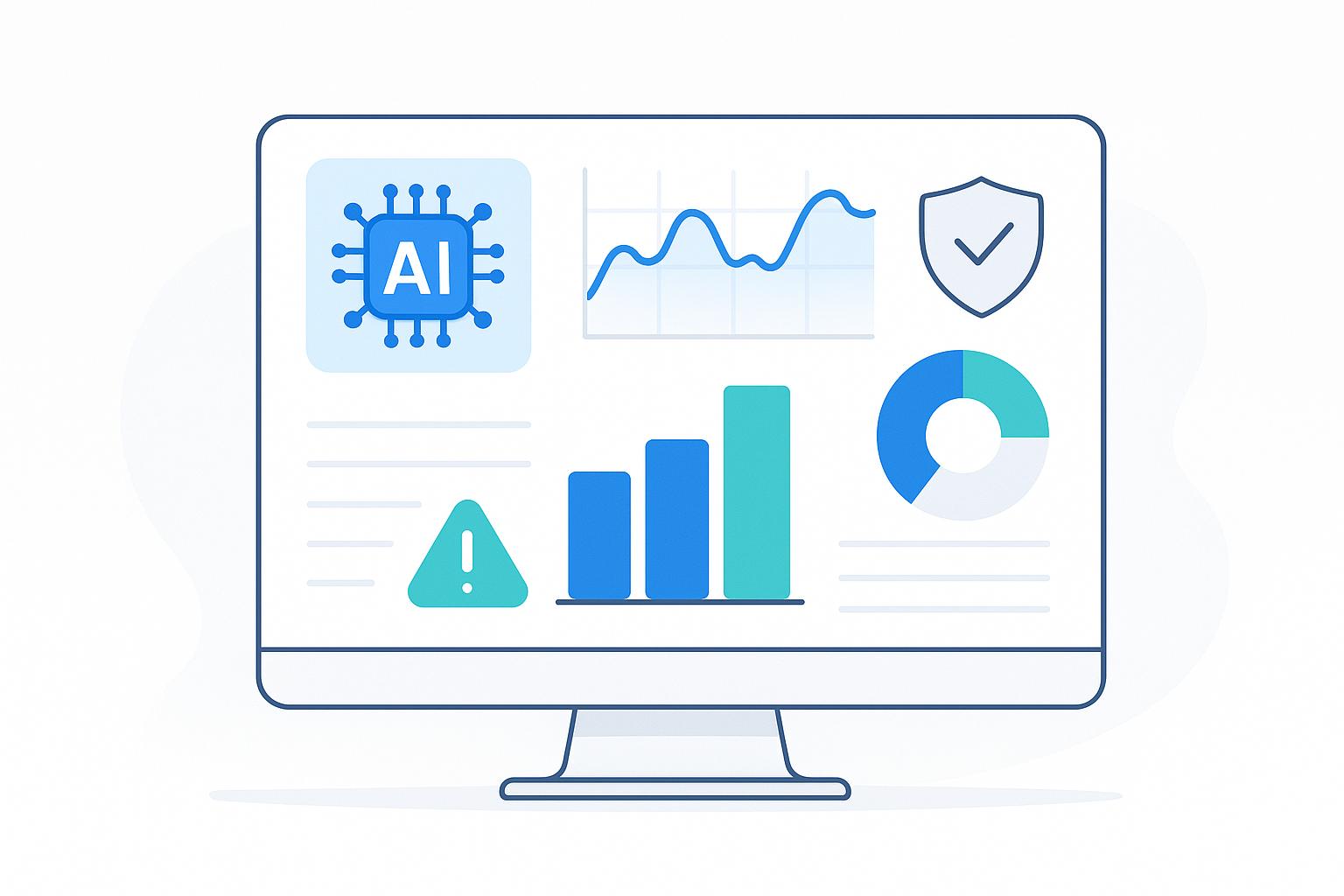AI is transforming how startups manage financial reporting by automating tasks, reducing errors, and improving decision-making. Startups often struggle with manual errors, compliance challenges, and scaling their financial operations. AI tools solve these problems by:
- Automating Data Processing: Tools like HighRadius and Lucid Financials streamline tasks like data entry, accounts receivable, and financial statement generation.
- Error Detection and Fraud Prevention: AI flags unusual transactions and reduces financial risks.
- Improving Forecasting: AI analyzes past data and market trends for accurate financial projections.
- Simplifying Compliance: Automated compliance checks ensure startups meet regulatory requirements effortlessly.
These tools save time, enhance accuracy, and scale with growth, allowing startups to focus on strategy while maintaining transparency with stakeholders. However, challenges like data security, system integration, and balancing automation with human oversight remain critical to address.
Putting AI to work for Finance
How Startups Can Use AI in Financial Reporting
Automating Data Collection and Processing
AI tools are changing how startups handle their financial data. Platforms like Lucid Financials connect directly with financial systems, automating data collection while keeping everything accurate in real-time. For example, HighRadius uses AI to simplify Accounts Receivable and Treasury tasks, helping businesses improve working capital management within just six months [1]. This kind of automation makes creating precise financial statements much easier.
Generating Financial Statements Automatically
AI takes over the tedious task of preparing financial statements such as balance sheets, cash flow reports, and income statements. These tools provide real-time updates, identify errors, and allow for dynamic tracking. What used to be a lengthy monthly task can now happen daily with minimal effort.
Spotting Errors and Fraud
AI excels at spotting unusual transaction patterns, helping startups catch potential fraud early and reduce financial risks. By continuously monitoring transactions, these systems ensure that suspicious activities are flagged right away. On top of that, AI helps startups plan ahead with more confidence and accuracy.
Enhancing Forecasting and Planning
AI makes forecasting more accurate by analyzing past data alongside current market trends. This approach turns financial projections into actionable insights, helping startups make smarter decisions and plan for growth with confidence.
Simplifying Compliance and Regulatory Reporting
AI isn’t just about internal processes - it also helps startups navigate regulatory requirements. These tools adapt to changes in regulations, automate compliance checks, and organize documentation with ease.
"AI-powered systems can automate compliance checks to identify potential fraud and ensure adherence to regulatory requirements, significantly reducing risk for startups" [2].
sbb-itb-17e8ec9
Advantages of AI Tools for Startup Financial Reporting
Saving Time and Improving Accuracy
AI tools handle routine tasks automatically, cutting down on manual work and reducing the chances of mistakes. This frees up finance teams to focus on bigger-picture strategies instead of getting bogged down by repetitive processes. For startups, this is especially helpful as they grow and face increasingly complicated financial requirements.
Tools That Scale With Growth
Platforms like Lucid Financials provide solutions that grow alongside startups, offering real-time insights and scenario planning to navigate changing market conditions. These tools allow startups to model various growth paths and make informed decisions on critical matters like hiring or securing investments. They not only help manage internal growth but also improve how startups showcase their financial strength to external audiences.
Clearer Communication with Stakeholders
AI-powered platforms have reshaped how startups share financial data with investors and board members. The ability to quickly produce accurate, polished reports is key to gaining stakeholder trust. These tools combine past performance with future projections, offering a clear and professional view of a startup’s financial position. This level of transparency is crucial in today’s fast-moving startup world, where quick, data-backed decisions often determine success in securing funding or executing key strategies.
Challenges of Using AI in Financial Reporting
Protecting Financial Data
Keeping financial data safe is a top priority for startups using AI in their reporting processes. Sensitive information flows through these systems, making it essential to implement measures like encryption, two-step verification, and continuous monitoring. Startups also need to comply with regulations such as GDPR and SOX to avoid legal and financial risks.
Integrating AI with Existing Systems
Merging AI tools with current financial platforms can be a technical headache. Many startups face challenges when trying to make their existing accounting software work seamlessly with new AI features. Common issues include data format mismatches, compatibility problems, and the need for real-time syncing. Solutions include adopting standardized data formats, leveraging APIs, and modernizing systems step by step.
Balancing Automation with Human Oversight
AI is great at crunching numbers and processing large datasets, but human expertise is still essential for interpreting results and making decisions. In fact, 61% of finance professionals believe AI will have a major impact on their industry within the next two years [3].
Take platforms like Zeni, for instance - they combine AI-driven automation with human oversight to ensure financial reports are both accurate and efficient. This approach uses AI for routine tasks while relying on humans for complex decisions. To make this work, startups should focus on regularly reviewing AI-generated reports, setting clear protocols for exceptions, and establishing manual override procedures.
The key to success lies in blending AI's efficiency with human judgment. Addressing these challenges allows startups to unlock AI's full potential in financial reporting while staying accurate and compliant.
Conclusion: Using AI to Improve Startup Financial Reporting
How AI Transforms Financial Reporting
AI is reshaping how startups handle financial reporting. Its ability to automate data processing, monitor compliance, and improve forecasting gives businesses an edge. These tools not only simplify complex tasks but also provide actionable insights that help startups make smarter decisions. And as AI continues to evolve, its impact on financial reporting will only grow.
Emerging Trends in AI for Finance
The world of financial reporting is changing fast. AI-powered tools are now capable of generating detailed financial statements and detecting fraud with greater accuracy [4]. Pairing AI with blockchain technology could take things even further, boosting the security and reliability of financial data - two areas startups often struggle with.
Practical Steps for Startups
For startups looking to enhance their financial processes, the first step is identifying areas where AI can make the biggest impact. Tasks like data entry and compliance checks are prime candidates for automation. Many AI platforms now offer tools that deliver real-time insights and handle reporting automatically, saving time and resources.
However, successful AI adoption isn’t just about automation. Startups must prioritize data security and ensure human oversight remains part of the process. Regular audits and monitoring can help fine-tune AI systems and keep them running smoothly.
"Regular audits and continuous monitoring can help identify areas for improvement and ensure AI systems operate efficiently and securely. For example, HighRadius offers measurable business outcomes such as DSO reduction, working capital optimization, and bad-debt reduction, demonstrating the tangible benefits of AI in financial reporting" [1].


